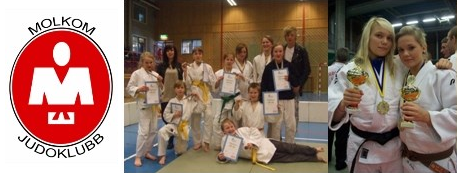Hi! My name is Lars Eriksson and currently 50 years old. I started with judo in 1971 in Storfors Judoclub, Sweden. We had already at that time foreign coaches in the club and it was through them we got our judoeducation. The coaches were Robert Dusil from Czechoslovakia and recently tragically now deceased Stephen Oravec. A very odd couple on the mat where Stefan was a cheerful fellow and Robert stood for the hard line. A little bit of “good cop” and “bad cop“. The mix was very successful and we got to see judo from many different perspectives. Then when Robert moved to Germany and Stefan also moved and started Olofströms judo club, Bengt Enghag took over that role our club. He is still the headcoach in Storfors Judoklubb 37 years later! The club has produced many Swedish champions over the years and this is a proof that Bengt’s trainings has paid off. As a coach, I can describe him as a dedicated and consistent. The advice was “Seionage” or “Uchi mata.” Quick, concise and often.
Unfortunately, I got away from judo in the early 80’s when there was much else that got my attention. It would take mee 25 years before I was in a dojo again and then as a coach in Molkom Judoclub. It took a few years to get into the terminology of thee role and the new rules. But now it feels absolutely right to try to help the young people I now work with to reach well-being and success. There are still a lot of 70’s judo I try to teach the kids and seems to still work. Also i learn many new things but fully trained will me never be. By being a coach at competitions I enjoy probably the most. It have over the years led to more and longer trips and more and more and heavier medals for my judokas. From a small trophy hunt to competitions at both national and high international levels.
My coach strategy is sstill the same. It’s still about a mutual respect for each other. I am very determined that it should be between me as a coach and my judoka who mostly the talk is between. We go together to the mat. It’s between us the talk occurs. I’ll be the one a judoka listen to and have eye contact with. We win and we lose together and it’s with me as a coach that judoka has contact with before, during and after the fight. Constructive criticism should be said after every fight regardless of the outcome. To always find something positive after every fight is vitally important. The negative or what things that needs to be improved, we take later. But when the judoka just left the mat and I greet him/her, there should always be something positive to take from the match. Parents and friends may come by later. When the judoka leaves the mat, what I do as a coach is to care and greet him/her in a positive way. Mutual respect should always be in a coachs work and we always look forward to the next game or the next competition together.
We now look forward to the next contests in Molkom Judoclub and hope that all our participating judokas get an educational contest where they develop as athletes and as individuals. The coach always learn something new in each contest and will bring their own mistakes and their own small triumphs to the next challenge.
In Molkom as elsewhere in Sweden judois facing the problem that we have to keep our talents in the sport during the “difficult” years between 13-18 when so many other things are tempting. The judokas reaching success on a regular basis is easier to keep than those who get it heavy for a period depending on both age and weight class changes.
We have been fortunate in our club where we have a large number of girls of the same age and weight, which led to sparring always been at the highest level. The group of exercisers / athletes that I have had the privilege to train and follow between 8-16 years of age has largely consisted of girls with a high competitive desire and ambition to succeed. Although this group has declined over the years but we still have managed to maintain a strong group that traveled and competed a lot together. Now this year they are being separated for various reasons like high school elsewhere and some other reasons. However, they are still a close-knit group who support each other.
In the last National Championship in 2012 Molkom JC had 4 girls competing and they took three gold and one bronze. This result reflects a strong team grown together and sparring against each other for about 6-7 years straight. The problem right now is to find challenges for every judoka. Many times judokas quit because they don’t get chances in the national team or district teamss during difficult years. We have in Molkom JC been a lot in England and competed in recent years and there our contestants had to face the national team girls at an early age.
In England, the national team are from youth 13 and up. The 6 highest ranked in each weight class and age group will be included in the national team and gets a red rose to sew on their judogi. These national teams is controlled entirely by rankingpoints and is therefore not static at all. The contests in England’s ranked competitions in different degrees, from star2-Star4 and they all give ranking points. After each semester count the different scores together and teams are then nominated. This means that everyone has a chance to get there and while everyone is at risk of falling out again. On most of the contests, especially the highest-rated ones, will therefore most of the country’s best judokas be there compete for ranking points. My own daughter had because of her age and weight class at the “Heart of England” a Star4 in Girls 15-48kg in 2011, about 23 contestants whom six of the squad were all there. The rankings in the table on sites 7 -12 was basically there also. The competition gathered 900 judokas! A better resistance than thiss was not possible and it’s the same with most of the competitionss in the UK. My daughter got 6 fight before the bronze was won and she was delighted.
Maybe it’s something to take on in Sweden perhaps? England took two medals at the Olympics in 2012. The Cadet Championships they also took many medals, as well as on a junior-level. I believe their investment in many judokas in many national team delivers results. This was some thoughts by a coach of a small club in the forests of northern Sweden.
Lars Eriksson
Molkom Judo Club


Hej Lars,det är interesant att tänka tillbaka över 45 aor,
när vi började i Storfors. Hjärtlig tack för Dina ord och
Dina höga principer till fostran av unga judokas med respect till sinn nästa. Grattis till framgaongar med unga och bronset av Dinn dotter!
Robert
Fantastiskt att läsa om Storfors Judo. Det var där jag började min lilla enkla bana en gång i tiden . Jag minns Robert och Stefan mkt väl precis som Bengt.Ett kul minne jag har var att vi åkte på tävling i Oxelesund och jag hamnade i bilen där Robert körde. Minnet var att han visslade hela vägen dit och hem igen.Jag har nu hamnat i Simrishamn och efter drygt 40 år tagit upp Budo igen. Är numera hjälptränare för Simrishamns Budoklubb där mina barn tränar ett par dgr i veckan.Har stor nytta av den lilla tid som jag var med Storfors Judoklubb där jag oftast tränade med Löllke och Peter Åkesson. Skulle va kul att komma upp och träna lite med er så här på gamla dgr.
Stort tack och vänligast från Roland Skåning Nilsson Simrishamn